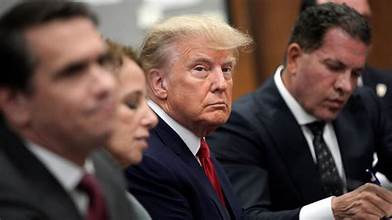Team Trump Is Ready to Lose the Supreme Court Immunity Case. They’re Celebrating

Donald Trump’s inner circle doesn’t expect the Supreme Court to go along with his extreme arguments about executive power in the immunity case before the justices. But what the high court does now is almost beside the point: Trump already won.
Three people with direct knowledge of the matter tell Rolling Stone that many of the former president’s lawyers and political advisers have already accepted that the justices will likely rule against him, and reject his claims to expansive presidential immunity in perpetuity. Bringing the case before the court — after a federal appeals court in Washington, D.C., shut down their arguments on executive power — was a delaying tactic designed to push Trump’s criminal election subversion trial past Election Day this fall. The strategy paid off so much more than MAGAworld anticipated.
“We already pulled off the heist,” says a source close to Trump, noting it doesn’t matter to them what the Supreme Court decides now.
Trump’s lawyers and other confidants had widely expected — and had told the former president as much — that the court maneuver would delay the election subversion trial, but perhaps only to around the summer. For months, Trump attorneys were actively preparing themselves and their client to face a trial, over his efforts to overturn the 2020 election and his role in the violent Jan. 6 assault at the U.S. Capitol, right around the time of the Republican Party’s nominating convention, the sources add.
If the federal trial were to proceed during this election year, much of Team Trump had predicted it would be significantly more damaging politically to the presumptive Republican presidential nominee than, for instance, his ongoing criminal hush-money trial in Manhattan.
“We planned for that exhausting schedule and split screen,” says a person involved with the planning.
But the Supreme Court’s conservative supermajority, which Trump built as president, came through for him in a way that many Trump advisers didn’t believe was probable. When news broke in late February that the court would take up Trump’s claims of vast immunity, Trumpland was so elated that a lawyer close to Trump told Rolling Stone they were “literally popping champagne.”
Special Counsel Jack Smith had initially tried to expedite the election subversion case by asking the Supreme Court to rule on Trump’s immunity claims, even as a lower appeals court considered Trump’s arguments in December of 2023. The court denied the special counsel’s request, helping to delay the process as the case wound its way through the appeals court.
The Supreme Court later agreed to consider Trump’s claims — handing Trump a major win, as it almost certainly pushed his trial back past Election Day in November. For Trump’s 2024 campaign and his top attorneys, the battle ended there and has been over for two months now.
While Trump’s lawyers don’t broadly expect the Supreme Court to accept the former president’s views on immunity, there is of course risk that the ultra-conservative court does bless them to some extent — and his claims are extreme, to say the least.
Throughout the process, Trump’s lawyers have argued along two fronts. First, they have claimed that impeachment is the only constitutional avenue for handling criminal acts committed by a president while in office, regardless of when he is prosecuted for them. The Senate failed to convict Trump on charges that he incited the Jan. 6 insurrection, when it impeached him a second time shortly after he left office. His lawyers claim that any attempt to prosecute him outside of the impeachment framework represents an unconstitutional form of double jeopardy.
Second, Trump’s attorneys have tried to argue that principles from civil cases against sitting presidents — where precedent holds that the chief executive enjoys absolute civil immunity for all official acts committed within the “outer perimeter” of his office — somehow also apply to the criminal case against him and prohibit prosecution.
After Trump’s attorneys appealed a district court’s dismissal of their arguments, they appealed to the federal appeals court in Washington.
During oral arguments before the appeals court, judges were incredulous at the implications of Trump’s views on executive power absent the check of criminal accountability. One stunned judge asked Trump’s lawyers, “Could a president who ordered SEAL Team Six to assassinate a political rival, and is not impeached, would he be subject to criminal prosecution?”
The response from Trump’s lawyer, John Sauer, was chilling: “If he were impeached and convicted first … my answer is qualified yes, there is a political process that would have to occur first,” he said. In other words, under Trump’s vision of immunity, he could not be prosecuted for ordering an assassination — he would first have to be impeached and convicted.
At the Supreme Court, Sauer has argued the justices should not concern themselves with “lurid hypotheticals” that “almost certainly never will occur, and would virtually certainly result in impeachment and Senate conviction … if they did occur.”
-Rolling Stone



